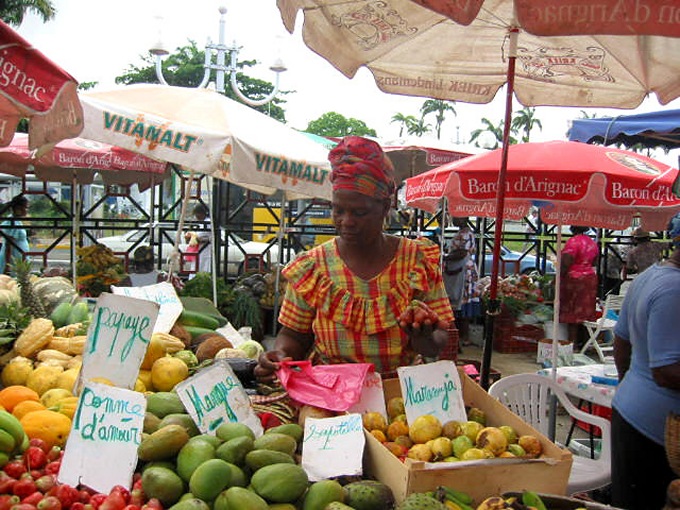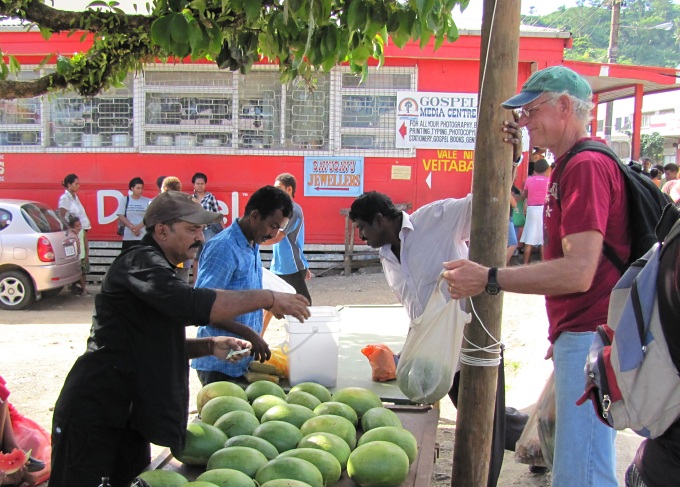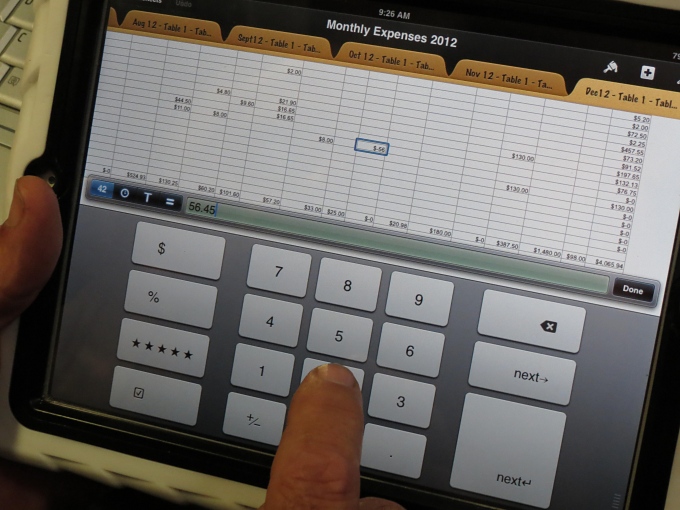Frugality. The definition in my Sage dictionary is “prudence in avoiding waste”. Nicely put. It then goes on to give synonyms which seem to diminish its value in my perception. Parsimony (nice...but no one usually knows what it means), thriftiness and finally penny-pinching. Cheap on the other hand connotes stinginess and an ungenerous nature. I think we're frugal, not cheap.
We keep to a budget. We actually account for everything we spend...from postcards to boat batteries, laundry to souvenirs. We just like to see where our money goes and it's always amazing at the end of the month when we determine what things we've frittered away our money on. It's definitely not meals out, but sometime we overdo on wine purchases or books or entertainment. Though we might not alter our spending habits, it's still nice to know where the money goes and where we could cut back should it become necessary. We both agree that boat parts and repairs take precedence over most other expenditures.

We hate to spend money on something we can't really enjoy. For instance, if we sail instead of motor, we save on diesel. At $1.65/liter (that's US$7/gallon), this can really add up. That said, there's sometimes more enjoyment in the arrival versus the process of getting there, so in that case, it might be worth the diesel expenditure. The point is, we weigh the enjoyment/necessity factor and make the decision. It doesn't just happen without some thought involved. When we save by not turning on the engine, we think of it as “credits” towards something that we'd enjoy more like going to a museum or a wildlife sanctuary. It's all about making choices.
We prefer to eat on the boat rather than eat at restaurants...obviously cheaper. I frequently pack picnic lunches for day-long excursions. We've found that when we have limited time some place, we hate to waste that time looking at menus and waiting for food service, when we can suss out a nice place to picnic and have some fruit and cheese, soak up the ambiance and not miss a minute of sightseeing.
I try to research every place we visit to determine what entertainment is free and what activities we think will be worth paying an admission fee. Self-guided city walking tours are fun and free. They give us the layout and feel of the city and if I've done my homework, we see the highlights without incurring major costs. We always see more when we're walking anyway...the architecture, statues and artwork tucked into nooks and crannies, historical markers, buskers. Many festivals offer free admission. The Royal Botanical Gardens are free here in Hobart as they were in Sydney. They might ask for a gold coin donation (Aussie $1 and $2 coins are gold in color), but a day in the botanical gardens is definitely worth a dollar or two to us and goes to a good cause.

On the boat, we're recyclers. An old dock line becomes a ocean-plait rug. We have several on the boat and we also give them as gifts. Old jacklines become the hoists for our homemade courtesy flags. They're also great for retaining extra jerry jugs in place on deck. Old sails become canvas buckets or are used for patching. The salvaged parts of our old bimini became the cover for the outboard and several ditty bags David uses for stowing various tools and parts. We try to make sure that nothing of value goes to waste.
If we're doing a haul-out or major repairs, we bite the bullet and stay in a marina. If we decide to leave Cups for any period of time, we also prefer her to be in a marina or at least on a sturdy mooring where someone can watch out for her every once in awhile. Otherwise, we prefer to anchor out. No fees involved.
I might add that we were not always this way although we've both been pretty conservative spenders most of our lives. We did, however, buy a boat, sell off all of our land anchors and head off into the sunset over a decade ago, so there go the theories of logic and sobriety out the window.
If you follow this blog, you'll know that I've always shopped in thrift shops and love going to yard sales. Part of me likes the adventure and the challenge of finding something I need or want and not paying full retail price for it. I was always a coupon-er, too, although that's not as popular here as it is in the States. We do get fuel discounts with our grocery purchases and they especially work to our benefit when buying diesel fuel for the boat. A diesel fuel purchase last week with a discount coupon saved us $27. We also stock up on paperback books when we're back in the States at 25-50¢ each. Books in the rest of the world are very expensive. We read them and then trade them. Twenty five books purchased for 50¢ each become 25 new books... over and over and over again. Kindle may change all that.

At the grocery store, we're pretty good about buying what's on sale. Unless there's some special occasion, like turkey for Christmas, we don't shop with a preconceived notion of what we'll be having for dinners for the coming week. Instead, we tailor our menu choices around what's available, in season and on sale. I remember finding and using recipes for breadfruit in the Carib and taro in Vanuatu.
We shop at local markets when we can and buy in quantity when it makes sense. Onions and potatoes are particularly good buys here at the moment and store well. When bought in 5 or 10kg sacks, the cost per pound/kg drops drastically. We do not buy frozen foods nor any prepared foods. Well, licorice sticks, chips and cookies once in awhile... although with the junk-less New Year's resolution those purchases have nearly disappeared. (You gotta splurge once in awhile!) I can-process (jar) turkey burger (mince) and chicken which we alternate with caught fish when we're out at sea. We pick local fruit and berries when it's available and can those for later use as well. Can-processed food, by the way, can last a year or more.
When it comes to buying something we could make ourselves or buying a service we could perform ourselves, we're usually willing to expend hours of our own labor, rather that buy a product or contract a service. If we make it, we know how it's made and the materials that go into it. If we perform the service ourselves, we know what was done and how it was done. Part of our rationale for this is being prudent as much as frugal.

The primary difference between frugal and cheap? I think it's the intent. We always attempt to pay our way. We don't sponge off people. We don't try to gyp anyone out of money that's due them. We don't avoid paying national parks fees or sneak into museums to avoid paying admissions. We are discriminating, however, in which parks and museums we choose to visit. We're not extravagant in our tastes. We're okay with inexpensive wine and home brew. We're not embarrassed to tell people we'd prefer not to eat out in an expensive restaurant nor attend an activity that doesn't seem value-rich.
Frugality has become more of a challenge and a game for us than a negative issue and it's allowed us to continue sailing for these past 13 years with the hope of many years to come. When we quit sailing, it won't be because of lack of funds.
So...how much does it actually cost us to live aboard Nine of Cups each year? Stay tuned for Part II of this blogpost. And if you're interested, we'll also share our budget with you.
And the nautical terms from yesterday are:
Futtock - curved timber that forms the rib of a ship
Sny - Curve of a ship from amidships to the bow or stern
Joggle - notching process
Trunnel - wooden pegs (or dowels) used to fasten timbers together
--------------------------------------------------------------------------------------------------------------------------------------------------------
Days and Ways to Celebrate
A daily list of mostly obscure holidays and fun ways to celebrate them.
Feast of Fabulous Wild Men
I don't get this one. What's a wild man? A cave man type... neanderthal? Hmmm. Maybe more the adventurous type like Jack London. Let's go with the creative, wild types. Read a little “Call of the Wild” or go to the zoo.








